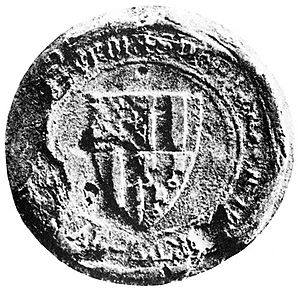Philip of Majorca facts for kids
Philip of Majorca (born 1288, died 1343) was a prince, also known as an infante, from the Kingdom of Majorca. He was a member of the Franciscan religious order and served as a regent for the Kingdom of Majorca between 1324 and 1329. Philip was known for supporting groups like the Beguines and Spiritual Franciscans, who believed in a very simple life and that all religious leaders should be poor. He spent a lot of his life trying to start a new religious order based on Franciscan ideas, but he was not successful.
Growing Up
Philip was the youngest of four sons born to King James II of Majorca and Esclaramunda of Foix. His family, the House of Barcelona, was very religious. For example, his grandfather, King James I, gave up his crown to become a monk. Philip's oldest brother, James, also gave up his right to become king to join the Franciscan order. His sister, Sancha, even wanted to end her marriage to become a nun.
His Life's Work
While studying in Paris, Philip first thought about joining the Dominican Order. But he soon realized he wanted a stricter, simpler life. He also felt a strong connection to the Beguines, so he decided to join the Franciscan Third Order instead.
Like his father, Philip was friendly towards the Spiritual Franciscans. He supported their idea that all religious leaders should live in poverty, no matter how important they were. He continued to support them even after Pope John XXII said their beliefs were wrong in 1316.
After his studies, Philip became the treasurer of Tours Cathedral. He also held other important church positions. He even turned down the offer to become the Archbishop of Tarragona, a very high position that his relative, King James II of Aragon, wanted for his own son.
Philip greatly admired Angelo da Clareno, another Franciscan, who also admired Philip. Philip believed that the rules of the Franciscan order should be followed as strictly as possible. He surrounded himself with other religious people and ordinary people who thought the same way.
Because of Philip, Majorca became a safe place for the Beguine Spirituals. These groups were being treated badly in southern France because their beliefs were seen as wrong by the church. However, Philip couldn't protect them forever, and some eventually felt he had let them down.
In 1316 and 1317, Philip was encouraged by Angelo da Clareno to think about starting a new religious order. This new group would follow the rules of Saint Francis very strictly. Philip and his friends called themselves the "Brothers of the Poor Life." He asked Pope John XXII many times to officially recognize this new group, but the Pope never did. The Pope even tried to make Philip happy by offering him a new high position as the Bishop of Mirepoix, but Philip refused this too.
Leading the Kingdom
When Philip's older brother, King Sancho, died in 1324, the crown of Majorca went to his young nephew, King James III. James was still a child, so a group of people needed to rule the kingdom for him.
However, James II of Aragon also claimed the throne. He said that an old rule stated that if the King of Majorca had no sons, the crown would go to the King of Aragon. King Sancho had disagreed with this and had set up a council of three citizens from Majorca to rule for his nephew.
This council soon had to share power with Philip. Even though Philip was not experienced in politics, within a year he convinced the King of Aragon to give up his claim to the throne. Philip also arranged for the ten-year-old King of Majorca to be engaged to the King of Aragon's five-year-old daughter, Constance.
During his time as regent, Philip gave special rights to the Jewish people in the kingdom. He also tried to protect people who were seen as "Spirituals" from the Inquisition, which was a church court that investigated people for beliefs considered wrong. He also worked to shield Jewish people from growing hatred.
Overall, Philip's time as regent was not very successful. His gentle nature and religious focus sometimes caused problems with the towns and powerful families in the small kingdom. The young King James III also grew to dislike his uncle, especially because Philip put his favorite helper, Adhémar de Mosset, in charge of looking after the young king. When James III became old enough to rule on his own in 1329, he even had his uncle's former helper tried for having beliefs considered wrong by the church.
Later Years
After he was no longer involved in ruling Majorca, Philip left the island. He moved to the court of his sister and brother-in-law in Naples, where he lived the rest of his life. Soon after arriving, he gave up all his church positions.
The court in Naples was not very friendly towards the Pope. This encouraged Philip to openly criticize Pope John XXII in a sermon. He said that even though the Pope had made rules against them, the "Brothers of the Poor Life" were truly following the teachings of the Bible. He tried one more time to establish his religious order, but Pope Benedict XII confirmed his predecessor's decision not to recognize it.
See also
 In Spanish: Felipe de Mallorca para niños
In Spanish: Felipe de Mallorca para niños
 | James Van Der Zee |
 | Alma Thomas |
 | Ellis Wilson |
 | Margaret Taylor-Burroughs |


